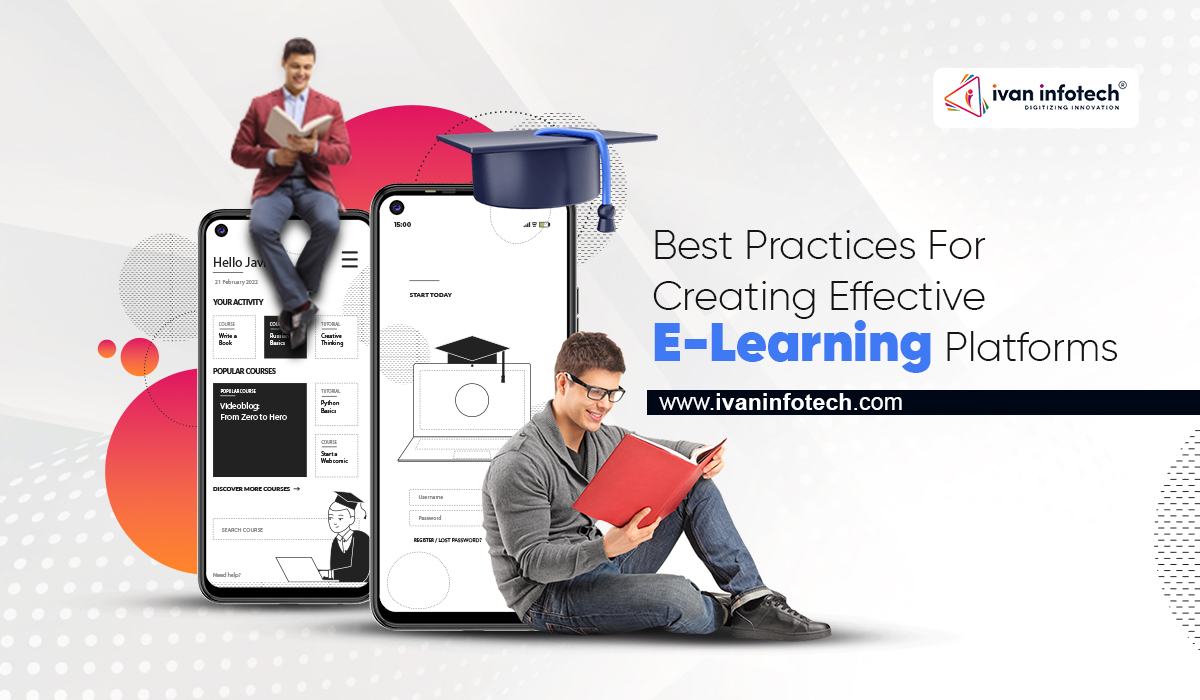
Steps to Creating Effective E-Learning Platforms
Currently, e-learning platforms have become indispensable tools for organisations and educational institutions. Developing an effective e-learning software solution requires a strategic approach and the expertise of professionals. With their in-depth knowledge and experience, e-learning development professionals can create engaging, learner-centric platforms that drive successful outcomes. Here are the key steps to get an effective e-learning platform developed by professionals, ensuring a seamless and impactful learning experience.
Steps To Take To Build An Effective E-Learning Platform
Define Your Goals and Requirements
To begin the development process, clearly define your goals and requirements for the e-learning platform. Identify the target audience, desired learning outcomes, and the specific features and functionalities you require. Determine if you need custom content development, integration with existing systems, or any specific branding elements. By providing a comprehensive overview of your needs, you can effectively communicate your vision to the professionals and ensure that the platform aligns with your objectives.
Research and Select a Professional E-Learning Development Team
Research and identify e-learning software solution providers or agencies that specialise in creating e-learning platforms. Look for teams with expertise in instructional design, multimedia development, and learning management systems (LMS). Review their portfolios, client testimonials, and case studies to assess their track record and determine if their expertise matches your requirements. Additionally, consider factors such as their technical capabilities, communication skills, and project management processes.
Collaborate on Instructional Design and Content Development
Effective instructional design is crucial for creating engaging and impactful e-learning experiences. Collaborate closely with the development team to outline the instructional strategy, course structure, and content development plan. Share any existing content, reference materials, or subject matter expertise that can support the development process. Work together to design interactive and visually appealing modules, incorporating multimedia elements and interactive assessments aligned with the desired learning outcomes.
Prioritise User Experience and Interface Design
A user-friendly interface and seamless user experience (UX) are essential for an effective e-learning platform. Engage the development team in discussions about interface design, navigation, and accessibility. Define the visual style, colour scheme, and branding elements to ensure consistency with your organisation’s identity. Collaborate on creating intuitive navigation menus, progress tracking mechanisms, and features that enhance the overall user experience. Usability testing and feedback loops offered under educational software development services will help refine the design and optimise the user interface.
Leverage Technology and Learning Management Systems
Selecting the right technology stack and learning management system (LMS) is crucial for the successful implementation of your e-learning platform. Work with the development team to evaluate available options and choose an LMS that aligns with your requirements and technical infrastructure. Consider factors such as scalability, compatibility with different devices, reporting capabilities, and integration with other systems. Leverage the expertise of the development team to ensure a seamless integration of the chosen LMS and technology stack.
Test, Iterate, and Refine
Thorough testing is vital to identify and address any issues or bugs before launching the e-learning platform. Collaborate with the development team to conduct extensive testing on different devices, browsers, and operating systems. Test the e-learning software solution’s responsiveness, functionality, and performance to ensure a smooth user experience. Encourage feedback from users, instructors, and administrators during the testing phase to gather insights and make necessary refinements. Iteratively improve the platform based on user feedback and ensure its readiness for launch.
Provide Comprehensive Training and Ongoing Support
Once the e-learning platform is developed, ensure that users receive comprehensive training and ongoing support. Collaborate with the development team to create user manuals, video tutorials, and help documentation to guide learners, instructors, and administrators. Conduct training sessions to familiarise them with the platform’s features, navigation, and functionalities. Your e-learning software solution would include technical support channels, such as email or a dedicated helpdesk, to address any queries or issues that may arise during platform usage. Regularly update and enhance the platform based on user feedback and evolving needs.
Implement Quality Assurance and Security Measures
Ensure that quality assurance processes are in place to maintain the integrity and security of your e-learning platform. Collaborate with the development team to conduct regular audits and security checks to identify and address any vulnerabilities. Implement data encryption, secure user authentication, and access control mechanisms to protect user information. Regularly backup data and ensure disaster recovery procedures are in place. Compliance with industry standards and regulations, such as GDPR or HIPAA, should be a priority to ensure data privacy and legal compliance.
Evaluate and Continuously Improve the Platform
Monitor the performance and effectiveness of your e-learning platform continuously. Collect user feedback, track user engagement metrics, and conduct periodic evaluations to assess the platform’s impact on learning outcomes. Analyse the data and use it to drive improvements and enhancements. Collaborate with the development team to implement updates, fix bugs, and introduce new features or content based on the feedback and evaluation results. Regularly review the platform’s alignment with evolving industry trends and technological advancements to stay ahead of the curve.
Foster Collaboration and Community Engagement
Encourage collaboration and community engagement within your e-learning platform. Implement discussion forums, chat features, or social learning spaces where learners can interact, share insights, and collaborate. Facilitate the formation of communities of practice or learning groups to encourage knowledge sharing and peer support. Foster a sense of belonging and engagement by organising virtual events, webinars, or live Q&A sessions. Continuous engagement and community-building efforts will create a vibrant learning ecosystem within your e-learning platform.
Developing an effective e-learning software solution with professional expertise requires a systematic approach and collaboration with experienced e-learning development teams. By defining your goals, collaborating on instructional design, prioritising user experience, leveraging technology, testing rigorously, and providing ongoing support, you can ensure the success of your e-learning platform. Continuous evaluation, improvement, and fostering collaboration will drive engagement and maximise the platform’s impact on learning outcomes. Ivan Infotech has the expertise to create a powerful and transformative e-learning experience for your learners.
Subscribe to the Newsletter
Don’t lag behind in the ever-evolving age. Stay updated with all tech news and trends. We will not fill your inbox with spam mails. You will only receive updates about the cream contents.
Want Assistance with Software Development?
Anything you need in terms of software, you can count on us. With knowledge, skills and years of experience, we create tailor-made, integrated development solutions with high-end technologies.























Categories
Ai software solution
API Development Services
app development
Application Maintenance
AR And VR Software Development
AR Software Development
Artificial Intelligence
Asset Tracking
Automated system
Big Data
Block Chain Development
Blockchain Development Solution
Blog
cloud computing solutions
CMS Development Services
Construction Software Solution
CRM
custom web application
Digital Asset Management
Digital Marketing
Digital Services
Ecommerce Industry Solutions
ecommerce solution provider
Education Software Development
education software development Solution
Education Software Solution
ERP Software Development
Event Ticketing Software Solution
Finance Software Solution
Food and beverage software
Graphic Design
Healthcare software solution
hospitality software development solutions
hotel software solution
IMS
IOT
IT application development
IT Consultancy
IT services
IT solutions
Java
Java App Development
Lead Generation Services
Legal Software Development
mobile app design
opensource software development
pos software development Solution
Quality Assurance
Real estate software
Restaurant Software Solution
Retail IT Solutions
Retail Management Software
software development
Software Security
Software Testing
Sports Software Development
Supply Chain Software Solution
Transportation Software Development
Travel & Hospitality
UI and UX design
Uncategorized
Web Design
Web development service
Web Programming